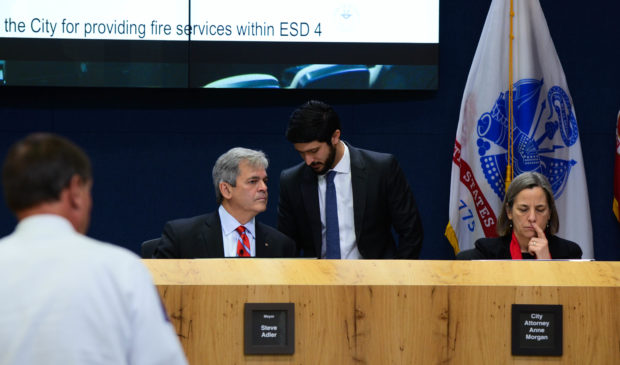Council OKs rules for expedited permitting
Friday, March 3, 2017 by
Jo Clifton Working with advocates for developers and construction workers, City Council Member Greg Casar carefully negotiated the details of an ordinance requiring developers of large commercial projects to pay a living wage and follow other rules set forth in the Better Builder Program in order to qualify for expedited permitting.
The ordinance applies to commercial projects of more than 75,000 square feet or $7.5 million in construction value that have no residential component. It does not apply to projects not seeking expedited permitting or residential projects.
Council ultimately approved the ordinance and associated fees unanimously on Thursday, but what started out as an easy morning item turned into a lengthy discussion before it was approved in the afternoon.
Casar explained that he had worked for two years with advocates from the Workers Defense Project and the Real Estate Council of Austin, among others, to reach a compromise. Bo Delp, speaking on behalf of the workers group, endorsed the proposal, and Nick Moulinet, on behalf of RECA, said his group could live with the ordinance as drafted.
But some Council members wanted to make changes when it came before them.
Council members Ann Kitchen and Alison Alter both wanted clarifications to ensure that developers of large projects did not escape the provisions of the ordinance by submitting individual plans for overall developments that would later be larger than 75,000 square feet.
Assistant City Attorney Brent Lloyd told Council he thought it was clear that there was no loophole in the proposed ordinance, but at their request he wrote a short amendment to ensure that no such loophole existed.
Moulinet told Council, “Strange bedfellows for something like this – but after two years and Council Member Casar’s efforts, we think we’ve come to a place that gives us a point of beginning. I think that’s important for what we’re trying to do. What we’re trying to find is an ordinance or rules to put in place that allows those things that we can all agree on – that is workers protection, workers safety, a better place to work.”
Casar and city staff promised to put the Better Builder Program details on the city’s website.
Moulinet said that originally RECA had a problem with the Better Builder Program because it was housed on the website of a political action group that he did not name. However, he was referring to the Workers Defense Project. Moulinet reiterated what Casar had said: His group was officially neutral on the ordinance, but he was concerned about any changes. It turned out later that the changes were not a problem for RECA.
The ordinance provides that a project may be certified by an unaffiliated third party, such as the Better Builder Program, if it provides for comparable requirements. Those include payment of a living wage, completion of safety training known as OSHA-10 training, workers compensation, hiring goals from local craft training programs, compliance with all applicable state, federal and local laws, and independent on-site monitoring.
Originally, the ordinance would have allowed a member of the city staff to approve the “similar program,” but Casar amended the ordinance so that it must come back to Council for approval of any additional third-party programs.
Council Member Jimmy Flannigan proposed a change that would have eliminated the term Better Builder Program from the ordinance but provided that builders must comply with the same requirements set forth in the original.
Such a radical change would have upended the delicate balance Casar had orchestrated between the Workers Defense Project and RECA, and he rejected it immediately.
Casar explained that leaders in the construction worker industry had reason to be suspicious of promises by the city. In the past, Council promised that workers would receive a living wage, but later a city official told the contractor that they didn’t have to follow that directive. Casar did not go into specifics, but he was obviously referring to construction of the Downtown Marriott. Casar worked as an organizer for the Workers Defense Project before his 2014 campaign for Council.
Council Member Ellen Troxclair seconded Flannigan’s motion, joining Council Member Ora Houston in voting for the amendment, which failed in a voted of 3-8.
Photo by John Flynn. This story has been corrected to accurately reflect the vote on Flannigan’s amendment, which failed in a vote of 3-8, not 2-9.
The Austin Monitor’s work is made possible by donations from the community. Though our reporting covers donors from time to time, we are careful to keep business and editorial efforts separate while maintaining transparency. A complete list of donors is available here, and our code of ethics is explained here.
You're a community leader
And we’re honored you look to us for serious, in-depth news. You know a strong community needs local and dedicated watchdog reporting. We’re here for you and that won’t change. Now will you take the powerful next step and support our nonprofit news organization?



